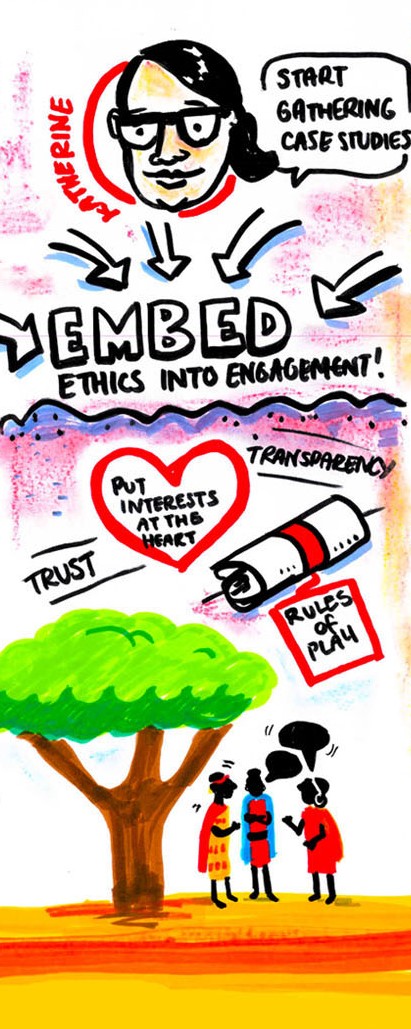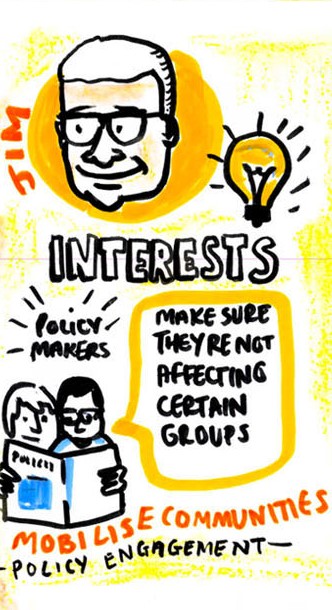There are many ways in which engaging communities with health research can be complex. The scientific concepts themselves are often rife with complexity. Engagement practitioners are regularly responsible for finding techniques to navigate this complexity and ensure the science is aptly understood to enable meaningful engagement to occur. Some of these techniques for engaging communities with complex science are explored in our Mesh reports on visualisation and metaphor, and narrative and storytelling. However, beyond the complexity of the science itself there is also a landscape of complexity surrounding the science. Science raises questions for society and the act of engagement requires delving deep into these questions. It is this complexity that we explore through this page.
Ethical Complexity in Engagement
Ethical complexity arises in many areas of engagement: reinforcing power dynamics through who we involve in engagement; incentivising participation in trials; creating risk for those participating in engagement activities where stigma exists; and navigating vulnerability and inclusion, to name just a few. A 2016 conference in Oxford, UK, explored the ethics and politics of engagement in depth and dozens of case studies and learnings from the workshop can be found on the ethics and politics of engagement workshop page on Mesh. There is a perceived disconnect between the social science research that explores ethics and engagement, like that presented in the aforementioned workshop, and the engagement practitioners. As such, there is work to be done to connect these groups and share learning between them to ensure practice represents theory when it comes to ethical engagement. This was explored in part by Katherine Littler in her presentation on social complexity, summarised below, and many practitioners agreed that a checklist for ethics in engagement, and markers for when official ethics approval should be sought, would be very valuable. Such a checklist does not, to our knowledge, currently exist.

Caption: This graphic was produced by a group at the 2017 International Engagement Workshop as part of a session on visualising complexity. The group chose to represent ethics in engagement as their topic of interest and this was the result.
Social Complexity in Engagement
Katherine Littler, Wellcome Trust, UK
Katherine Littler is a Senior Policy Advisor at the Wellcome Trust and you may wonder why she was present at a workshop on engagement. Her response to how social complexity presents in engagement answered this question almost immediately:
 "The complexity associated with policy uptake issues is something that this community needs to grapple with", she began.
"The complexity associated with policy uptake issues is something that this community needs to grapple with", she began.
Whether it is social science or biomedical research, the pathways to uptake in policy are very complex. If we are to claim that engagement is part of those pathways the engagement community must start gathering case studies to show where it has happened and to demonstrate the spectrum of policy uptake work that engagement can play a role within. Much of Katherine's work is around emerging technologies, sample sharing and pandemic preparation, all of which have engagement at their core. "Engagement", she says, "gives you the social license to do this work."
Aside from the policy question, Katherine broached the complexity of the ethical issues that flow out of engagement. To address these in practice the need for "rules of engagement" was highlighted. To highlight why such rules are important, we can use the example of marketing. Those in the marketing business have a very sophisticated evidence base for the work they do. Marketing, though we may not always think of it as so, can be a very two-way process with information gathered from the audience feeding back into the marketing process and the product that it represents. Marketing even has an ethical code of conduct. But it is important to recognise the difference, because we feel innately that there is one, between marketing and engagement. Engagement has at its core a mindfulness of the interests of the individuals and communities being engaged, and a transparency of the interests of those doing the engaging. There is much to be learnt from marketing conduct, but to separate itself engagement needs to define for itself a set of rules, principles, or an ethical framework, that outlines how we put these interests at the centre of engagement work, and how to ensure engagement is ethical.
These rules could encompass something overarching and applicable across contexts, research areas and activity types, but be layered to take variety and complexity into account. They might include principles of building trust, respect, transparency, of how to take the voices of many into account, and what your obligations to a community may be. These rules may not yet exist but the call to action for the community to develop them was well received and there is potential there for the future.
Image Caption: Graphic Illustration of Katherine Littler's talk on social complexity
Jim Lavery, Emory University, USA

"Stakeholders are all those who hold a legitimate interest in the conduct and outcomes of whatever it is you are doing. Engagement, is the act of uncovering those interests and gaining insights into the ways the interests of those stakeholders are effected by your work."
Jim Lavery asserted that uncovering stakeholder interests is not a simple task. Often, interests will be hidden and will be layered with complexity. There are welfare interests such as security, safety and livelihoods but overlaid on these are ulterior interests like personal ambition. These interests are not always easily articulated and this is made more socially complex when we, as researchers or engagement professionals, come with agendas and presumptions that can disregard or mask stakeholder interests.
Some key considerations for navigating the complexity of stakeholder interests are to consider what constitutes fair representation of a given interest; to be aware that interests are likely to conflict; and to understand how people align around interests (for example looking at how networks are evaluated). In community engagement, this complexity may also be abated by thinking of communities not as geographic, but as clusters of stakeholders who hold a similar set of interests.
Image Caption: Graphic Illustration on Jim Lavery's talk on social complexity
Case Examples of Cultural Complexity
Science, Art, Community: Building Interactive Understanding of Albinism in Tanzania
A case study on a project that seeks to understand and challenge stigma against albinism in Tanzania.
Cultural Complexity and Talking Trees
Talking Trees is a public health research project and forum addressing female genital mutilation among pastoralists’ communities of Kenya.
Confluence of the Old and New: Understanding Resistance to New Born Screening in Nigeria
This project uses focus groups and a community radio project in an effort to better understand, and engage in dialogue about, the cultural beliefs that are opposing new born screening in Nigeria.
The content on this page forms part of the online report for the 2017 International Engagement Workshop "It's Complicated: navigating scientific complexity in public and community engagement". To learn more about the workshop, access the rest of the report and browse the video presentations, discussion summaries, and tools made available from it, visit the workshop page.
This work, unless stated otherwise, is licensed under a Creative Commons Attribution 4.0 International License

